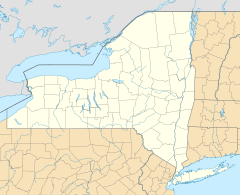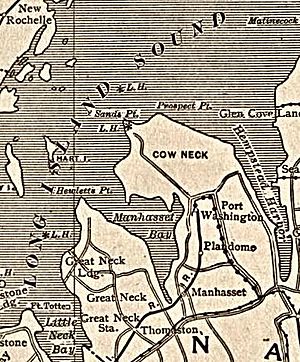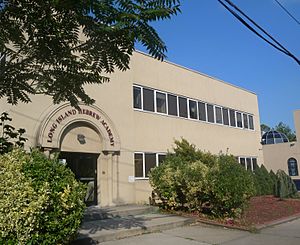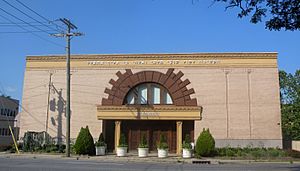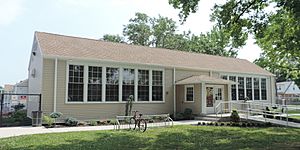Great Neck, New York facts for kids
Quick facts for kids
Great Neck
Madnan's Neck
|
|
|---|---|
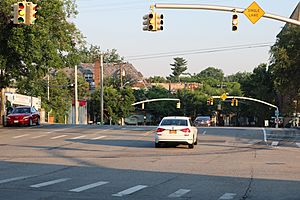
Middle Neck Road in Great Neck. This road runs along the center of the Great Neck Peninsula.
|
|
| Country | |
| State | |
| County | Nassau County |
| Town | North Hempstead |
| Area | |
| • Total | 1.4 sq mi (3.5 km2) |
| • Land | 1.4 sq mi (3.5 km2) |
| • Water | 0.0 sq mi (0.0 km2) 0% |
| Elevation | 69 ft (21 m) |
| Population
(2010)
|
|
| • Total | 9,989 |
| • Density | 7,062.3/sq mi (2,726.8/km2) |
| Time zone | UTC-5 (Eastern (EST)) |
| • Summer (DST) | UTC-4 (EDT) |
| ZIP Codes |
11020–11027
|
| Area code(s) | 516 |
| FIPS code | 36-30169 |
| GNIS feature ID | 0951636 |
Great Neck is a region in Nassau County, New York, located on Long Island. It sits on a peninsula on the North Shore. This area includes nine villages and several unincorporated areas. Some of the villages are Great Neck, Great Neck Estates, and Kings Point.
The village of Great Neck had about 9,989 people in 2010. The larger Great Neck area is a community of about 40,000 people. It includes nine villages and small communities called hamlets within the town of North Hempstead. Great Neck has five ZIP Codes (11020–11024). These areas share a park district, a library district, and one school district.
The hamlets are like statistical areas and are not officially recognized by local governments. However, there are local neighborhoods within these hamlets. Examples include Harbor Hills and University Gardens.
Contents
History of Great Neck
Early Days: Native Americans and European Settlers
Before European settlers arrived in the 1600s, the Mattinecock Native Americans lived along the shores of the Great Neck peninsula. They used the Long Island Sound for fishing and trading. They called this area "Menhaden-Ock," likely because of the many fish found there.
When European settlers came in the 1640s, the name changed to "Madnan's Neck." By 1670, it became "Great Neck." A local story says "Madnan's Neck" was named after Anne Hutchinson. She supposedly tried to claim land in what is now Kings Point. Her strong personality might have earned her the nickname "Mad Nan."
In 1643, the land, including Great Neck, was sold to Robert Fordham and John Carman. At first, the Mattinecock people and the settlers got along well. The Mattinecock shared their knowledge of the land, and the settlers offered new tools. But soon, problems grew over land and property. In 1684, the Mattinecock leader, Tackapousha, was paid to settle land claims. His body is buried in a cemetery near the Lakeville AME Zion Church.
Dutch Influence and Independence
The first European to see the Great Neck peninsula was Captain Adriaen Block in 1614. His ship sank, and his crew built a new one called the Onrust. They sailed around Long Island, mapping it. Later, Robert Fordham and John Carman came to Great Neck by boat.
In 1644, Willem Kieft, the leader of New Netherland (the Dutch colony), gave the community permission to govern itself. This meant they could choose their own leaders and make their own religious decisions.
The Dutch controlled Long Island from 1642 to 1664. During this time, local officials were elected by town meetings. They made laws, like a tax on alcohol that helped pay for ammunition and education. They also set rules for behavior and holidays.
Over time, Great Neck wanted more independence from the larger town of Hempstead. After some disagreements, the Dutch government finally allowed Madnan's Neck to be "separate" in 1687. It then had its own marshal and constable, becoming a fully working town.
Modern Great Neck: A Changing Community
In the late 1800s, Great Neck became a train stop for the New York and Flushing Railroad. It started changing from a farming village into a place where people lived and traveled to work in the city.
Great Neck, especially the Village of Kings Point, was the setting for F. Scott Fitzgerald's famous book The Great Gatsby. It was called "West Egg" in the book, known for its "new money" wealth. This reflected how Great Neck was changing in the 1920s. Many famous people, like Sid Caesar and the Marx Brothers, moved here.
After World War II, many Ashkenazi Jews moved to Great Neck. They built synagogues and community groups. They also worked to make the public schools excellent. From 1947 to 1952, the United Nations was temporarily located nearby in Lake Success while its main building was being built in Manhattan. Eleanor Roosevelt worked there, leading the UN Commission on Human Rights.
In the 1980s, many Iranian Jews moved to Great Neck after the 1979 Islamic Revolution. They started their own synagogues and shops, adding to the community's diversity. Since the late 1990s, more Orthodox Jews have moved to the area. Also, many East Asians, like Chinese and Korean families, have moved to Great Neck. They come for the good schools and because it's close to other Asian communities like Flushing.
Communities in Great Neck
Great Neck is made up of 9 official villages and 6 unofficial hamlets:
Getting Around Great Neck
Great Neck is about a 30 to 40-minute train ride from Manhattan's Penn Station. You can take the Port Washington Branch of the Long Island Rail Road to the Great Neck station.
Local buses, called Nassau Inter-County Express, connect the villages to the train station. They also offer service to other places in Nassau County and Queens.
Emergency Services
Most of Great Neck is protected by the Nassau County Police Department. However, some villages like Great Neck Estates and Kings Point have their own police departments. These local police forces get help from the Nassau County Police when needed.
Great Neck has three volunteer fire departments:
- The Great Neck Alert Fire Company (founded 1901)
- The Great Neck Vigilant Fire Company (founded 1904)
- The Manhasset-Lakeville Fire Department (Company 3 founded 1912, Company 4 founded 1926)
These departments provide fire and rescue services. The Vigilant Fire Company and the Manhasset-Lakeville Fire Department also offer emergency ambulance services.
Parks and Fun Activities
The Great Neck Park District manages places like the Parkwood Pool and skating rink complex. It also takes care of the Village Green and parts of Kings Point Park. The Park District serves most of Great Neck. Areas not covered by the Park District have their own facilities run by their villages.
Parkwood offers tennis and skating lessons. In the summer, it's part of the Great Neck day camp program, where kids use the swimming pools.
Economy
Great Neck is known as an affluent (wealthy) town. Many residents work in New York City and commute from Great Neck.
Culture and Things to See
Great Neck is mostly a residential area, so it doesn't have many "touristy" spots. But here are a few notable places:
- Saddle Rock Grist Mill: A historic mill powered by tides, which has been operating since the 1700s.
- United States Merchant Marine Academy: A college in Kings Point for training future officers in the Merchant Marine.
- Steppingstone Park: Once part of Walter Chrysler's large estate. It hosts summer concerts on Saturday nights.
- Kings Point Park
- Great Neck Arts Center
- Great Neck Plaza Shopping District: A downtown area with many shops.
- Great Neck Plaza Promenade Nights: During summer, streets in the downtown area are closed. Restaurants set up outdoor seating, and there's live music and entertainment.
- Handful of Keys: A special mural painted by William Cochran in Great Neck Plaza. It uses a technique called trompe l'oeil, which means "fool the eye."
- F. Scott Fitzgerald's House: The author of The Great Gatsby lived in Great Neck in the 1920s. His book's fictional town, "West Egg," was inspired by Great Neck, especially Kings Point.
Education in Great Neck
The Great Neck Library is the public library system. It has four branches: Main, Station, Parkville, and Lakeville.
The Great Neck Union Free School District serves most of Great Neck. It also includes parts of nearby New Hyde Park and Manhasset Hills. About 6,200 students from kindergarten to 12th grade attend Great Neck Public Schools.
There are three high schools:
- Great Neck North High School
- Great Neck South High School
- Great Neck Village High School (a smaller, alternative high school)
There are also two middle schools and four elementary schools. Students come from many different backgrounds and countries.
Great Neck's two main high schools are considered among the best in the country. Their students often do well in national science competitions.
Private schools in the area include North Shore Hebrew Academy.
Famous People from Great Neck
Many notable people have lived in or are from Great Neck:
- David Baltimore: Nobel Prize-winning biologist.
- Nikki Blonsky: Actress from Hairspray.
- Sid Caesar: Famous television comedian.
- Walter Chrysler: Founder of the Chrysler Corporation.
- George M. Cohan: Famous entertainer and composer.
- Francis Ford Coppola: Award-winning film director.
- Will Durant: Famous historian and author.
- F. Scott Fitzgerald: Author of The Great Gatsby.
- Whitey Ford: Legendary New York Yankees pitcher.
- Alan King: Comedian and actor.
- Andy Kaufman: Comedian and actor.
- The Marx Brothers: Famous comedy group.
- Paul Newman: Well-known actor.
- Eleanor Roosevelt: Former First Lady, lived nearby when the UN was in Lake Success.
- Sarah Hughes: Olympic gold medalist in figure skating.
- George Segal: Actor.
- Talia Shire: Actress from The Godfather and Rocky movies.
- Alfred P. Sloan: Former president of General Motors.
- P. G. Wodehouse: Famous English comic writer.
- Herman Wouk: Award-winning author.
See also
 In Spanish: Great Neck para niños
In Spanish: Great Neck para niños


